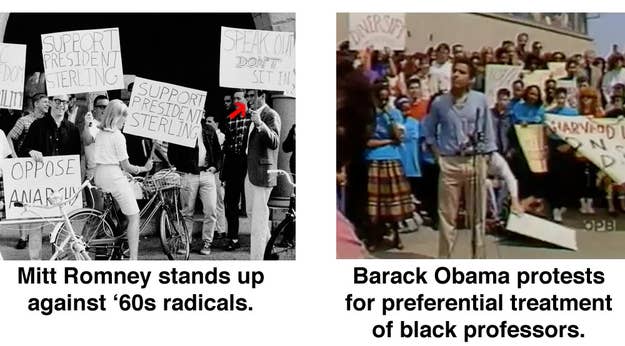
Barack Obama's early career was based in part on a promise his 2008 campaign seemed to fulfill: He would drain the poison the Baby Boomers' injected into American politics.
As he said that summer:
What is striking about today's patriotism debate is the degree to which it remains rooted in the culture wars of the 1960s – in arguments that go back forty years or more.
In the early years of the civil rights movement and opposition to the Vietnam War, defenders of the status quo often accused anybody who questioned the wisdom of government policies of being unpatriotic.
Meanwhile, some of those in the so-called counter-culture of the Sixties reacted not merely by criticizing particular government policies, but by attacking the symbols, and in extreme cases, the very idea, of America itself – by burning flags; by blaming America for all that was wrong with the world; and perhaps most tragically, by failing to honor those veterans coming home from Vietnam, something that remains a national shame to this day.
Most Americans never bought into these simplistic world-views – these caricatures of left and right. Most Americans understood that dissent does not make one unpatriotic, and that there is nothing smart or sophisticated about a cynical disregard for America's traditions and institutions.
Obama is, technically, a very young boomer, but as a reality he's a child of the '70s, and grew up in a mellower, post-Vietnam left. McCain, meanwhile, was too old to be a boomer, and had in any event devoted his career to -- with John Kerry -- healing the national wounds of Vietnam, and he little intrest in deepening them. He had signaled a capacity during the primary to touch those nerves -- he ran an ad attacking Hillary Clinton for funding a Woodstock museum, an attack that strengthened Obama's own case that he would turn the generational page. When Sarah Palin tried to link Obama to the ugliest of the '60s left in the person of former terrorist Bill Ayers, Obama's rebuttal was generational: Obama would reply mockingly that he was eight years old when Ayers was setting off bombs, simply a member of a different generation and free from blame.

We thought the culture wars were over. But they were only on pause, and they have returned with a vengeance. And while Newt Gingrich wages them with a special enthusiasm, it's Mitt Romney who embodies an attack on Obama that's beginning to crystallize on the right, an old battle of culture versus counterculture, and one that takes them back to the elite campus politics of the '60s.
Romney and Obama, after all, were both student protesters. Romney held a sign in favor of the Stanford administration and the Vietnam draft, which he avoided by serving as a Mormon missionary; Obama came of political age at Columbia University during the anti-Reagan nuclear freeze movement, and a decade later participated in protests at Harvard in favor of granting tenure for black and female professors.
Republicans have vowed not to miss another opportunity to attack Obama's roots, ideology, and character. Democrats, meanwhile, have signaled an all-out assault on Romney, one that currently focuses on his personal wealth, but that won't be likely to stop there. The old Boomer wars of culture vs. counterculture wars, submerged for a cycle, are straining to break out again.
